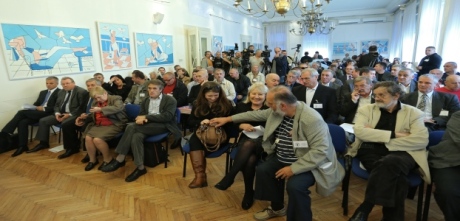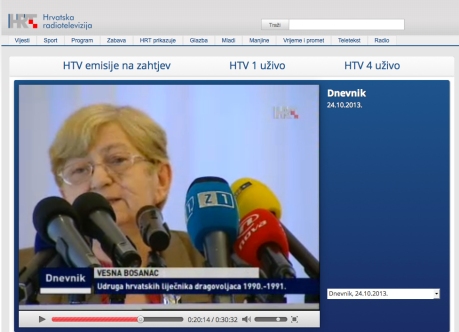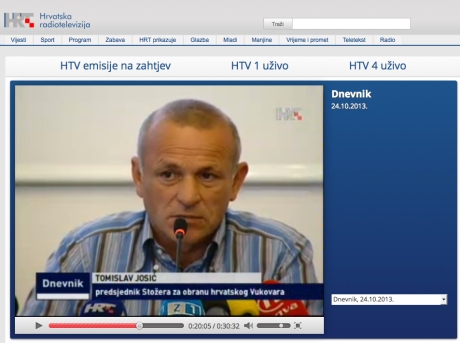Croatia: Cyrillic Tampers With Our Hearts – Croats Announce Referendum On Bilingual Ethnic Minority Rightsby inavukic |

Public Discussion on Cyrillic in Vukovar
Zagreb, Croatia, 24 October 2013
Photo: Sanjin Strukin/Pixsell
Zagreb, Croatia, 24 October 2013
Photo: Sanjin Strukin/Pixsell
“The will of the people shall be the basis of the authority of government; this will shall be expressed in periodic and genuine elections which shall be by universal and equal suffrage and shall be held by secret vote or by equivalent free voting procedures.” Article 21 (3) - Universal Declaration of Human Rights.
And now if we turn the spotlight upon Croatia’s transition into democracy (from totalitarian regime of communism) that still lasts, without a doubt, those who uphold human rights know that transition must engage the design and implementation of inclusive national consultations on transitional justice mechanisms; support the establishment of truth-seeking processes, judicial accountability mechanisms, and reparations programs; and enhance institutional reform.
The issue of introducing Cyrillic script (Serbian) alongside the Latin one (Croatian) in Vukovar has attracted a plethora of reactions worldwide; praise and recriminations! The praises went and go towards expressing agreement with the human rights of victims to be afforded due respect and consideration while at the same time maintaining the focus on the need to prosecute war criminals. The recriminations went and go towards rehashing unassociated events of WWII instead of rehashing the events of Croatia’s Homeland War, that are associated. But, of course, if the latter applied then the critics of the protests against Cyrillic in Vukovar would not have a leg to stand on.
Another bilingual sign was torn down this week in Vukovar, reported 22 October Croatian TV HRT.
Problems with bilingual signs continue in the eastern town of Vukovar and although the world wouldn’t know it if it depended on mainstream media, this issue has escalated to a national issue of profound and widespread discontent that won’t go away any time soon. On Tuesday new dual-alphabet Latin and Serbian Cyrillic signs were erected on the Croatian Employment Institute in Vukovar, replacing the ones that had been torn down by protestors twice previously only to be torn down overnight. The police are investigating as to who was behind this latest incident.
Prime Minister Zoran Milanovic met last week in Vukovar with those who in past months led the protests against the introduction of Serbian Cyrillic script there. At the meeting it was agreed that the heavy police presence guarding the controversial signs would be withdrawn. Another meeting is scheduled for Zagreb.
The Committee for the defence of Croatian Vukovar said that it had nothing to do with the latest incident and announced that they’ll be coming to the scheduled meeting with the Prime Minister next Monday with an ultimatum:
If the bilingual signs are not taken down they would cease collaborating with the government and press forth with collecting citizens’ signatures for a referendum in which people would record their views as to the following three questions:
1. Do they agree that the threshold for the introduction of bilingualism be raised to 50% of ethnic minority population?
2. Do they agree that Vukovar be declared as a place of special piety?
3. Do they agree that persons who had participated in the aggression be banned from working in public service?
1. Do they agree that the threshold for the introduction of bilingualism be raised to 50% of ethnic minority population?
2. Do they agree that Vukovar be declared as a place of special piety?
3. Do they agree that persons who had participated in the aggression be banned from working in public service?
In its news program 24 October HRT reports that another bilingual sign had been torn down overnight, the one which was nailed three meters high on the criminal court building in Vukovar last Monday! But this wasn’t all; another bilingual sign was torn down in the afternoon and that was the one that replaced the one torn down a couple of days ago (beginning of this article) and replaced the same day.
HRT also reported that the Committee for the defence of Croatian Vukovar has commenced public discussions on bilingual signs and on the initiative that Vukovar be declared a place of special piety. The first public forum was held Thursday 24 October in European House Zagreb and it heard that the Committee seeks a moratorium on the constitutional law on ethnic minority rights until the next census and that a provision be introduced into the constitutional law which would require at least 50% representation of ethnic minority in a population before bilingual signs could be introduced.
Should the government not satisfy these demands, the Committee for the defence of Croatian Vukovar and its supporters would do everything in their power for Vukovar to become an unwelcoming city for the government and its representatives. The public Forum also announced the possibility of a referendum (as set out above).
Dr Vesna Bosanac, who headed the Vukovar hospital during its destruction and massacres by Serb aggressor in 1991, said at the public discussion forum: “Cyrillic bothers us because they (Serbs) were celebrating Cyrillic while murdering us … we all suffer from PTS (post traumatic stress) and this Cyrillic is the trigger that’s pushing us backwards. Regardless of the fact that the Prime Minister and his followers explain that all us Croats are above all that and that in essence the Cyrillic is not important at all, to us it is important. To us – it is very important, it tampers with our hearts …”.

Dr. Vesna Bosanac, Association of Croatian
doctors volunteers 1990 - 1991
Photo: Screenshot HRT TV News 24. 10. 2013
doctors volunteers 1990 - 1991
Photo: Screenshot HRT TV News 24. 10. 2013
Croatian veteran Tomislav Josic, president of the Committee for the defence of Croatian Vukovar, emphasised at the public forum that nobody has yet been made to answer for the excessive shelling and bombing of Vukovar and that the Committee is fighting against the introduction of bilingual signs because the census figures upon which the erection of the same is based, are unreliable.
He further said “war criminals walk freely through Vukovar and have not been prosecuted. 750 were murdered at Velepromet concentration camp and nobody has been made to answer for that … It’s said in our country that everything is according to law. Privatisation was also implemented according to law. I would like to see who wrote those laws. Others should have initiated public discussion, create forums and then pass laws.”

Tomislav Josic, President of
Committee for the defence of Croatian Vukovar
Photo: Screenshot HRT TV news 24.10.2013
Committee for the defence of Croatian Vukovar
Photo: Screenshot HRT TV news 24.10.2013
Indeed, Vukovar is a horribly wounded city. And the government is not listening or seeing.
One gets the unsettling feeling that the government holds the view that reconciliation between Croats and Serbs in the region can be achieved via force – turning a deaf ear and a blind eye to the suffering of victims and the need to have suspected war criminals processed. Prime Minister and all the ministers keep telling us that the law must be adhered to but fail miserably at acknowledging the fact that the same law allows for discretionary powers if applying that law causes unrest and controversies, to put it plainly.
Furthermore, the Croatian government seems to act as if laws of the country are not the patch it is supposed to work in; that is, as if it has nothing to do with the government, that someone else passed that law and it must adhere to it!
What a tragic stand for a government to stick to! Governments exist to change, amend existing laws and bring in new ones if people circumstances demand or require that. That is the beauty of democracy and an absolute necessity with a transitional democracy. Regretfully, both the full and the transitional democracy in Croatia have quite a stretch to run under such incompetent governance. But, of course, it may not be incompetence of the government we’re talking about here at all – it could well be that harsh politics are at play. And the harsh politics that come to mind are those that seek to equate the victim with the aggressor and those that still believe in totalitarianism!
Such being the case, the public discussions initiated by the Committee for the defence of Croatian Vukovar can only be applauded – loudly! For here, perhaps for the first time in the history of Croatian democracy (since 1991) we have people telling the government in no uncertain terms they want a say in the writing/composing text of laws!
Vukovar is indeed a place of special piety and it is, as of this week, a place for which the people – not the government - have spoken firmly for democracy and it’s legislation pathway! Ina Vukic, Prof. (Zgb); B.A., M.A.Ps. (Syd)
Related Recent Posts:
Nema komentara:
Objavi komentar